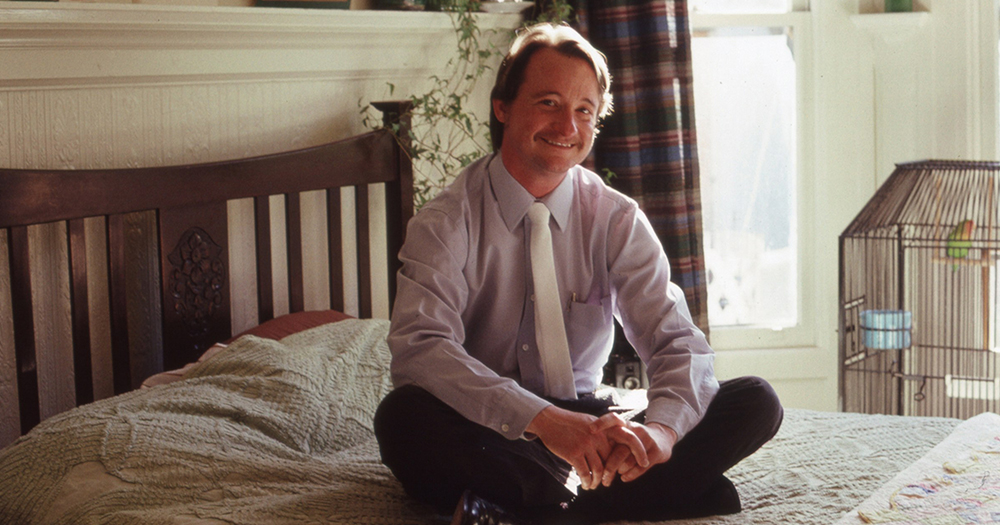“[They] said I couldn’t live as a gay man, but it looks like I’m going to die like one.” Thus wrote Lou Sullivan, an openly gay, transgender and HIV Positive man, in his diaries in mid-1980’s San Fransisco. The extraordinary diaries, which The New Yorker has dubbed “a radical testament to trans happiness,” were published at the end of September, in a volume called We Both Laughed in Pleasure: The Selected Diaries of Lou Sullivan.
They chronicle a life of activism, joy, sorrow and the struggle for both his sexuality and gender to be recognised simultaneously.
Sullivan was born in Milwaukee in 1951. Aged 10, he began to write the diary which he would keep throughout the remainder of his life. As an adolescent, he made a vow to himself that he would someday publish his diaries, as a record of a “phenomenon such as myself.”
“A big fear of mine is that I will die before the gender professionals acknowledge that someone like me exists, and then I really won’t exist to prove them wrong,” he writes.
From a young age, he was confident in his assertion that he was different, but it wasn’t always clear to him what exactly that was.
“I wanna look like what I am but don’t know what someone like me looks like,” he wrote as a teenager. “I know how to be one of the boys, I never knew how to be a chick + I’m glad! Yet I think I can still be one of the guys + keep my identity as a girl, I hope, to make a pleasant combination,” he continued. His family was very supportive, especially his mother, who confessed that she may also have been transgender, had she known about the procedure when she was younger.
Sullivan lived at a time where being transgender was still classed as a mental illness, and one of the supposed categories for this was attraction to extremely feminine women. The separation of gender and sexuality was an almost unheard of idea, and the concept that someone might be both transgender and gay was a foreign one even to Sullivan’s friends in Milwaukee, where he moved after high school, who called him a “sissy butch” – a term he approved of. However, although here he was surrounded by an underground culture of gay men, feminists, lesbians and other transgender people, he still felt that he didn’t belong. “I can’t relate to anyone,” he wrote.
https://twitter.com/lpafridi/status/1179365342570786817?s=20
Even when Sullivan moved to San Fransisco, where he had access to therapists, doctors and transgender support groups, the coexistence of his gender and sexuality was almost disbelieved. In a question that has contemporary echoes in the Irish health system, Sullivan was asked by one doctor whether his daily routine was more masculine or feminine. His answer, later, to his diary, is both humorous and devastating:
“How the hell am I supposed to answer that?? Oh, I put cream + sugar in my coffee, that’s feminine; I like to watch boxing matches on TV, that’s masculine; I put bath oil in the tub, that’s feminine; and I use Brut deodorant, that’s masculine. [. . .] I left there rather discouraged. I first went to a bar (masculine!) and then home to cry (feminine!)”
In November 1979, at age 28, he began to take testosterone, and underwent a mastectomy operation the following July. He completed bottom surgery in 1986, shortly before he was diagnosed with AIDS. However it was after these events that his activism reached its height. During the last four years of his life, he published F.T.M., his trans community newsletter, and the the third edition of “Information for the Female to Male Cross Dresser and Transsexual,” which he said was the most important thing he had done. In 1990, the year before he died, he published a biography of Jack Bee Garland, a gay trans man who had lived in San Francisco in the 1930’s, and who was a kindred spirit for Sullivan.
“Though it is Garland’s story, it tells about me,” Sullivan writes in his diary. “It explains my reality for future generations of female-to-gay males.”
the opposite of loneliness is Lou Sullivan’s diaries
— lou (@archivalrival) September 29, 2019
Throughout the diaries, the struggles Sullivan faced appear alongside the joys of his life and the happiness he found in his relationships and in the cities where he lived. “It’s so hard to separate happiness + sorrow—sometimes they’re almost the same thing,” he said. One of the most poignant moments comes when he is sitting in a gay bar in San Fransisco shortly before his death:
“I’ve come all this way, gone thru this whole change, crossdressing 14 years, hormone shots for 8 yrs. Finally got all the surgery, or all I’m ever going to get. And now what? Now I sit here the same way I sat before hormones, before surgery. Now what? My future compressed into a shortened time slot. Most dead in 2 yrs. Some live for 5. [. . .] Yet it’s been worth all these years just to be in this bar, here, now, with AIDS, + to be a man among men.”
© 2019 GCN (Gay Community News). All rights reserved.
Support GCN
GCN is a free, vital resource for Ireland’s LGBTQ+ community since 1988.
GCN is a trading name of National LGBT Federation CLG, a registered charity - Charity Number: 20034580.
GCN relies on the generous support of the community and allies to sustain the crucial work that we do. Producing GCN is costly, and, in an industry which has been hugely impacted by rising costs, we need your support to help sustain and grow this vital resource.
Supporting GCN for as little as €1.99 per month will help us continue our work as Ireland’s free, independent LGBTQ+ media.
